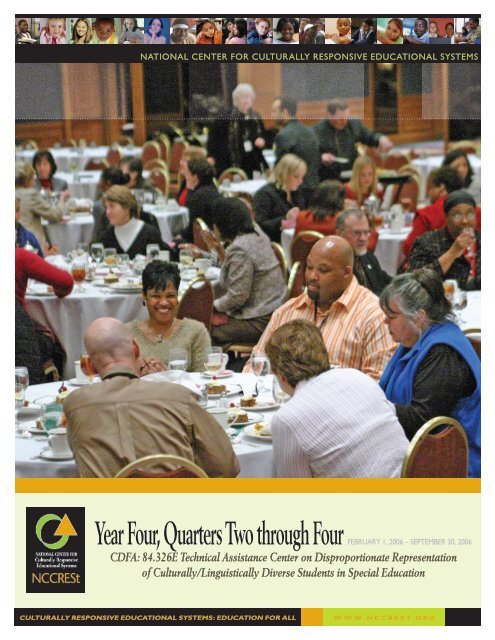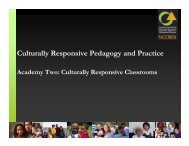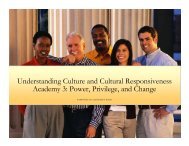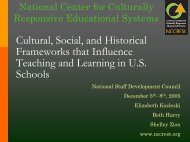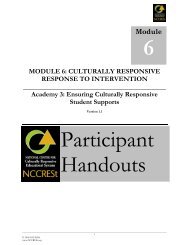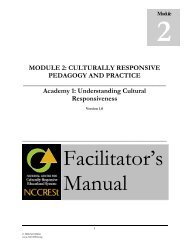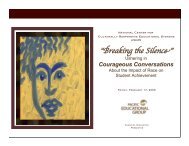CDFA: 84.326E Technical Assistance Center on ... - NCCRESt
CDFA: 84.326E Technical Assistance Center on ... - NCCRESt
CDFA: 84.326E Technical Assistance Center on ... - NCCRESt
- No tags were found...
You also want an ePaper? Increase the reach of your titles
YUMPU automatically turns print PDFs into web optimized ePapers that Google loves.
Nati<strong>on</strong>al <str<strong>on</strong>g>Center</str<strong>on</strong>g> for Culturally Resp<strong>on</strong>sive Educati<strong>on</strong>al SystemsThe missi<strong>on</strong> of the Nati<strong>on</strong>al <str<strong>on</strong>g>Center</str<strong>on</strong>g> forC u lt u r a l ly R e s p o n s i v e E d u c at i o n a lSystems is to support state and local schoolsystems to assure a quality, culturallyresp<strong>on</strong>sive educati<strong>on</strong> for all students.Culturally Resp<strong>on</strong>sive Educati<strong>on</strong>al Systems: Educati<strong>on</strong> for All w w w . n c c r e s t . o r g 2
Nati<strong>on</strong>al <str<strong>on</strong>g>Center</str<strong>on</strong>g> for Culturally Resp<strong>on</strong>sive Educati<strong>on</strong>al SystemsTable of C<strong>on</strong>tentsProject Overview . . . . . . . . . . . . . . . . . . . . . . . . . . . . . . . . . . . . . . . . . . . . . . . . . . . . . . . . . . . . . PAGE 5Goal 1: C<strong>on</strong>tinuous Improvement . . . . . . . . . . . . . . . . . . . . . . . . . . . . . . . . . . . . . . . . . . . . PAGE 6Goal 2: Research and Development . . . . . . . . . . . . . . . . . . . . . . . . . . . . . . . . . . . . . . . . . . PAGE 7Goal 3: Professi<strong>on</strong>al Development . . . . . . . . . . . . . . . . . . . . . . . . . . . . . . . . . . . . . . . . . . . PAGE 10Goal 4: Networking and Disseminati<strong>on</strong> . . . . . . . . . . . . . . . . . . . . . . . . . . . . . . . . . . . . . . PAGE 12State Partner Updates . . . . . . . . . . . . . . . . . . . . . . . . . . . . . . . . . . . . . . . . . . . . . . . . . . . . . . . . PAGE 14Culturally Resp<strong>on</strong>sive Educati<strong>on</strong>al Systems: Educati<strong>on</strong> for All w w w . n c c r e s t . o r g 4
Nati<strong>on</strong>al <str<strong>on</strong>g>Center</str<strong>on</strong>g> for Culturally Resp<strong>on</strong>sive Educati<strong>on</strong>al SystemsC<strong>on</strong>tinuousImprovementGoal 1: Increase knowledge and understanding throughevaluati<strong>on</strong> of current practice, change efforts, and impact.»»»»1.1 Collaborate with State Directors of SpecialEducati<strong>on</strong> and Project Forum to determine the level ofcompliance for each State in collecting the datarequired in secti<strong>on</strong> 618(c) of IDEA 2004.1.2 Develop a web-based, sensitive and resp<strong>on</strong>sivec<strong>on</strong>tinuous improvement cycle for each participatingstate educati<strong>on</strong> agency (SEA) that provides accuratebaselines and the basis for analyzing and interpretingthe data collected <strong>on</strong> representati<strong>on</strong> of minorities inspecial educati<strong>on</strong>, and informs SEAs and localeducati<strong>on</strong> agencies (LEAs) about the impact ofimplementing culturally competent practices inreading, behavior, and early interventi<strong>on</strong> and progressin achieving improvements.1.3 Develop accurate baselines and analyze theimpact of change efforts <strong>on</strong> student referral,placement and outcomes for students fromlinguistically and culturally diverse backgrounds inparticipating sites.1.4 Assist SEAs in developing a plan to addressdisproporti<strong>on</strong>ality that focuses <strong>on</strong> widespreadscreening and effective early interventi<strong>on</strong>.SummaryThe work of the C<strong>on</strong>tinuous Improvement Core Team for this periodfocused <strong>on</strong> resp<strong>on</strong>ding to the various professi<strong>on</strong>al development needsof the nine Partner States: New Jersey, Iowa, Ohio, Wisc<strong>on</strong>sin,C<strong>on</strong>necticut, Tennessee, Louisiana, North Carolina, and Virginia.These states received in-depth m<strong>on</strong>thly coaching and mentoringal<strong>on</strong>g with a fall nati<strong>on</strong>al meeting, site visits, problem solving sessi<strong>on</strong>s,leadership academies, a variety of tools and materials developedthrough the <str<strong>on</strong>g>Center</str<strong>on</strong>g> and targeted assistance with state identified issuesrelated to disproporti<strong>on</strong>ality and culturally resp<strong>on</strong>sive systems.<str<strong>on</strong>g>Technical</str<strong>on</strong>g> <str<strong>on</strong>g>Assistance</str<strong>on</strong>g> was provided to other states as requestedduring the past three quarters as well, including work with Alaska,California, Mississippi, Georgia, New York and Ariz<strong>on</strong>a.Accomplishments• 8 site visits and technical assistance provided to state partners• 1st Annual Nati<strong>on</strong>al Forum – Creating Opportunities to Learn:A Forum Addressing Disproporti<strong>on</strong>ality• 2 State Liais<strong>on</strong> meetings in Denver, CO• 8 district profiles completed.Next Steps■ Prepare materials for the October Training of Trainers meeting.■ C<strong>on</strong>necticut Case Study■ Ohio OISM C<strong>on</strong>ference■ Assist states with finding effective ways toorganize resources and utilize dataT e c h n i c a l A s s i s t a n c e P r o v i d e d F e b r u a r y 1 – S e p t e m b e r 3 0State Date Who attended<str<strong>on</strong>g>Technical</str<strong>on</strong>g><str<strong>on</strong>g>Assistance</str<strong>on</strong>g> (TA)RequestedProfessi<strong>on</strong>alDevelopment(PD) ToolFocus of TAMississippi February Elizabeth Kozleski Develop a Teachers’ SelfstudyGuide forCulturally Resp<strong>on</strong>sivePractices in Grades K-6:Reading and Mathematics• Cultural Resp<strong>on</strong>sivity • Pilot the matrix with teachers inMatrixMississippiC<strong>on</strong>necticut May Barbara Sparks TA – Case Study of twoschool districts• Building Walk ThroughProtocol• Focus Group InterviewProtocol• Initial fact finding visit to twoschool districts for case studyanalysis of issues related toreducti<strong>on</strong> of disproporti<strong>on</strong>alityC<strong>on</strong>tinuedCulturally Resp<strong>on</strong>sive Educati<strong>on</strong>al Systems: Educati<strong>on</strong> for All w w w . n c c r e s t . o r g 6
Nati<strong>on</strong>al <str<strong>on</strong>g>Center</str<strong>on</strong>g> for Culturally Resp<strong>on</strong>sive Educati<strong>on</strong>al SystemsC o n t i n u e d : T e c h n i c a l A s s i s t a n c e P r o v i d e d F e b r u a r y 1 – S e p t e m b e r 3 0State Date Who attended<str<strong>on</strong>g>Technical</str<strong>on</strong>g><str<strong>on</strong>g>Assistance</str<strong>on</strong>g> (TA)RequestedProfessi<strong>on</strong>alDevelopment(PD) ToolFocus of TALouisiana July Suzanne Arnold PD – Louisiana LeadsC<strong>on</strong>ference• District Rubric• School Assessment Tool• Provided an overview of both thedistrict rubric and schoolassessment toolLouisiana August Suzanne Arnold TA – Online platformsurveys• District Rubric• School Assessment Tool• Provided an <strong>on</strong>line envir<strong>on</strong>ment toadminister <strong>NCCRESt</strong> tools foridentified LA districts and schools.CT, NY, NC,WI, VA, TN,OH, LAFebruaryShelley Zi<strong>on</strong>,Suzanne Arnold,Elizabeth Kozleski,State Liais<strong>on</strong> Meeting• Maximizing Professi<strong>on</strong>al • Quarterly Reports DebriefingDevelopment Access and • Maximizing Professi<strong>on</strong>alResultsDevelopment for school districtsCT, NY, NC,WI, VA, TN,OH, LAJuneShelley Zi<strong>on</strong>,Suzanne Arnold,Elizabeth KozleskiSummer Liais<strong>on</strong> Meeting• Cognitive Coaching• Early Intervening andResp<strong>on</strong>se to Interventi<strong>on</strong>• Culturally Resp<strong>on</strong>siveMatrix• State liais<strong>on</strong>s examined state needsfor TA and PD to identifieddistricts.• Develop TA plans, evaluativemeasures and follow-up processesfor identified districts.Wisc<strong>on</strong>sinAugust14-17Shelley Zi<strong>on</strong>Wisc<strong>on</strong>sin Department ofPublic Instructi<strong>on</strong>Summer C<strong>on</strong>ference• Understanding Culture • Wisc<strong>on</strong>sin Statewide C<strong>on</strong>ferenceand CulturalResp<strong>on</strong>sivityResearch andDevelopmentGoal 2: Synthesize and expand research-based practicesfor linguistically and culturally diverse students.» 2.1 Using a c<strong>on</strong>ceptual framework to analyze andsynthesize empirically available informati<strong>on</strong> fromempirical research as well as stakeholder perspectives;summarize, synthesize and expand the existing evidencebasedpractices for educating and supporting students fromculturally and linguistically diverse backgrounds for lay,practiti<strong>on</strong>er, scholarly and policy audiences.» 2.2 Produce and update an accessible series ofsyntheses products and working papers <strong>on</strong> various topic’srelati<strong>on</strong> to the intersecti<strong>on</strong> of race, ethnicity, culture,ability and special educati<strong>on</strong> practice.»2.3 Produce a series of products grounded in the workof participating SEAs and LEAs achievements andpositi<strong>on</strong>s linked to the existing and <strong>on</strong>going databases,research syntheses, and currently funded projects.SummaryThe work of the Research and Development Core Team has focused<strong>on</strong> research presentati<strong>on</strong>s, c<strong>on</strong>tinued work <strong>on</strong> publicati<strong>on</strong>commitments, and <strong>on</strong> the development of research-based tools. Thisperiod the journal Educati<strong>on</strong>al Researcher released a special themeissue in August entitled “Representati<strong>on</strong> of Minority Students inSpecial Educati<strong>on</strong>: Complicating Traditi<strong>on</strong>al Explanati<strong>on</strong>s” withAlfredo J. Artiles, Janette K. Klingner, and William F. Tate as guesteditors. Core Team members have published 16 articles in scholarlyjournals as well as 13 other publicati<strong>on</strong>s that include chapters andbooks. The team also presented papers at several local, nati<strong>on</strong>al, andinternati<strong>on</strong>al c<strong>on</strong>ferences. Two new exemplars, the district rubric,and three new OnPoints were completed and added to the website.Culturally Resp<strong>on</strong>sive Educati<strong>on</strong>al Systems: Educati<strong>on</strong> for All w w w . n c c r e s t . o r g 7
Nati<strong>on</strong>al <str<strong>on</strong>g>Center</str<strong>on</strong>g> for Culturally Resp<strong>on</strong>sive Educati<strong>on</strong>al SystemsAccomplishments• The journal Educati<strong>on</strong>al Researcher released a specialtheme issue in August entitled “Representati<strong>on</strong> ofMinority Students in Special Educati<strong>on</strong>: ComplicatingTraditi<strong>on</strong>al Explanati<strong>on</strong>s” with Alfredo J. Artiles, JanetteK. Klingner, and William F. Tate as guest editors.• “Living the Dream in the Promised Land: Features ofHighly Successful Schools that Serve Students of Color”Exemplar completed and posted to the website• <strong>NCCRESt</strong> District Rubric “PreventingDisproporti<strong>on</strong>ality by Strengthening “District Policiesand Procedures — An Assessment and StrategicPlanning Process” completed and posted to the website• “Proactive Culturally Resp<strong>on</strong>sive Discipline” Exemplarcompleted and posted to website• 16 publicati<strong>on</strong>s in scholarly journals• 6 presentati<strong>on</strong>s at nati<strong>on</strong>al c<strong>on</strong>ferences• 2 presentati<strong>on</strong>s at internati<strong>on</strong>al c<strong>on</strong>ferences• 3 new OnPoints (Working Together, Transiti<strong>on</strong> Services,and Infusing Disability Studies) posted to websitePublicati<strong>on</strong>sArtiles, A. J., Harris-Murri, N., & Rostenberg, D. (2006). Inclusi<strong>on</strong>as social justice: Critical notes <strong>on</strong> discourses, assumpti<strong>on</strong>s, andthe road ahead. Theory into Practice, 45, 260-268.Artiles, A. J., & Klingner, J. K. (Eds.). (2006). Forging aknowledge base <strong>on</strong> English language learners with specialneeds: Theoretical, populati<strong>on</strong>, and technical issues. TeachersCollege Record, 108, 2187-2438. [Special issue]Artiles, A. J., & Klingner, J. K. (2006). Forging a knowledge base<strong>on</strong> English language learners with special needs: Theoretical,populati<strong>on</strong>, and technical issues. Teachers College Record, 108,2187-2194.Artiles, A., Klingner, J., & King, K. (in press). Bilingual specialeducati<strong>on</strong>. In J. M. G<strong>on</strong>zález (Ed.), Encyclopedia of BilingualEducati<strong>on</strong> in the United States. L<strong>on</strong>d<strong>on</strong>: SAGE.Artiles, A. J., Klingner, J. K., Tate, W. F. (Eds.). (2006).Representati<strong>on</strong> of minority students in special educati<strong>on</strong>:Complicating traditi<strong>on</strong>al explanati<strong>on</strong>s. Educati<strong>on</strong>al Researcher,35 (6), 3-28. [Special issue]Artiles, A. J., Klingner, J. K., & Tate, W. F. (2006). Representati<strong>on</strong>of minority students in special educati<strong>on</strong>: Complicatingtraditi<strong>on</strong>al explanati<strong>on</strong>s. Educati<strong>on</strong>al Researcher, 35 (6), 3-5.Artiles, A., Kozleski, E. B., Dorn, S., & Christensen, C. (Inpress). Learning in inclusive educati<strong>on</strong> research: Remediatingtheory and methods with a transformative agenda. Review ofResearch in Educati<strong>on</strong>, 30, 1-30.Haager, D., Klingner, J. K., & Vaughn, S. (Eds.) (in press).Validated reading practices for three tiers of interventi<strong>on</strong>.Baltimore, MD: Brookes.Harris, P., Baltodano, H., Artiles, A. J., & Rutherford, R. B.(2006). Integrati<strong>on</strong> of culture in reading studies for youth incorrecti<strong>on</strong>s: A literature review. Educati<strong>on</strong> and Treatment ofChildren, 29, 749-778.Harris-Murri, N. J. (2006). Living the dream in the promisedland: Features of highly successful schools that serve studentsof color. Exemplar Brief Series. Nati<strong>on</strong>al <str<strong>on</strong>g>Center</str<strong>on</strong>g> for CulturallyResp<strong>on</strong>sive Educati<strong>on</strong>al Systems (<strong>NCCRESt</strong>).Harris-Murri, N., King, K., & Rostenberg, D. (2006). Reducingdisproporti<strong>on</strong>ate minority representati<strong>on</strong> in emoti<strong>on</strong>al and behavioraldisorders: Toward a culturally resp<strong>on</strong>sive resp<strong>on</strong>se to interventi<strong>on</strong>model. Educati<strong>on</strong> and Treatment of Children, 29, 779-799.Harry, B., Arnaiz, P., Klingner, J., & Sturges, K. (in press). Schoolingand the c<strong>on</strong>structi<strong>on</strong> of identity am<strong>on</strong>g minority students inSpain and the United States. Journal of Special Educati<strong>on</strong>.Harry, B., & Klingner, J.K. (2006). Why are so many minoritystudents in special educati<strong>on</strong>? Understanding race and disabilityin schools. New York: Teachers College Press.Harry, B., Klingner, J. K., & Cramer, E. (in press). Case studies inthe social c<strong>on</strong>structi<strong>on</strong> of disability: Minority students in specialeducati<strong>on</strong>. New York: Teachers College Press.Hess, R., Molina, A., & Kozleski, E. B. (2006). Until Somebody HearsMe: Parental Voice and Advocacy in Special Educati<strong>on</strong> Decisi<strong>on</strong>-Making. British Journal of Special Educati<strong>on</strong>, 33, 3, 148-157.Hoover, J., Klingner, J. K., Baca, L., & Patt<strong>on</strong>, J. (in press). Methodsfor teaching culturally and linguistically diverse excepti<strong>on</strong>allearners. Upper Saddle River, NJ: Merrill/Prentice Hall.King, K., Harris-Murri, N. J., & Artiles, A. J. (2006). Proactiveculturally resp<strong>on</strong>sive discipline. Exemplar Brief Series. Nati<strong>on</strong>al<str<strong>on</strong>g>Center</str<strong>on</strong>g> for Culturally Resp<strong>on</strong>sive Educati<strong>on</strong>al Systems(<strong>NCCRESt</strong>).Klingner, J., & Artiles, A. J. (Eds.). (2006). English LanguageLearners struggling to learn to read: Emergent scholarship <strong>on</strong>linguistic differences and learning disabilities. Journal ofLearning Disabilities, 39, 99-156; 386-398. [Special issue]Klingner, J., & Artiles, A. J. (2006). English language learnersstruggling to learn to read: Emergent scholarship <strong>on</strong> linguisticdifferences and learning disabilities. Journal of LearningDisabilities, 39, 386--389.Klingner, J. K., Artiles, A. J., Baca, L., & Hoover, J. (Eds.) (inpress). English language learners who struggle with reading:Language acquisiti<strong>on</strong> or learning disabilities? Thousand Oaks,CA: Corwin Press.Klingner, J. K., Artiles, A. J., & Méndez Barletta, L. (2006).English language learners who struggle with reading: Languageacquisiti<strong>on</strong> or learning disabilities? Journal of LearningDisabilities, 39, 108-128.Klingner, J., & Bianco, M. (2006). What is special about specialeducati<strong>on</strong> for culturally and linguistically diverse students withdisabilities? In B. Cook & B. Schirmer (Eds.), What is specialabout special educati<strong>on</strong>? (pp. 37-53). Austin, TX: PRO-ED.Culturally Resp<strong>on</strong>sive Educati<strong>on</strong>al Systems: Educati<strong>on</strong> for All w w w . n c c r e s t . o r g 8
Nati<strong>on</strong>al <str<strong>on</strong>g>Center</str<strong>on</strong>g> for Culturally Resp<strong>on</strong>sive Educati<strong>on</strong>al SystemsKlingner, J. K., Blanchett, W., & Harry, B. (in press). Culturalperspectives <strong>on</strong> developmental disabilities. In S. L. Odom, R.H. Horner, M. Snell, & J. Blacher (Eds.), Handbook <strong>on</strong>developmental disabilities. New York: Guilford.Klingner, J. K., Cramer, E., & Harry, B. (2006). Challenges in theimplementati<strong>on</strong> of Success for All by four urban schools.Elementary School Journal, 106, 333-349.Klingner, J. K., & Edwards, P. (2006). Cultural c<strong>on</strong>siderati<strong>on</strong>swith resp<strong>on</strong>se to interventi<strong>on</strong> models. Reading ResearchQuarterly, 41, 108-117.Klingner, J. K., & Harry, B. (2006). The special educati<strong>on</strong> referraland decisi<strong>on</strong>-making process for English Language Learners:Child study team meetings and staffings. Teachers CollegeRecord 108, 2247-2281.Klingner, J. K., & Solano-Flores, G. (in press). Culturalresp<strong>on</strong>siveness in resp<strong>on</strong>se-to-interventi<strong>on</strong> models. InAccommodating students with disabilities: What works?Educati<strong>on</strong>al Testing Service.Klingner, J. K., Sorrells, A. M., & Barrera, M. (in press). Threetieredmodels with culturally and linguistically diverse students.In D. Haager, J. Klingner, & S. Vaughn (Eds.), Validated readingpractices for three tiers of interventi<strong>on</strong>. Baltimore, MD: Brookes.Klingner, J. K., Vaughn , S., & Boardman, A. (in press). Teachingreading comprehensi<strong>on</strong> to students with learning disabilities.New York: Guilford Trent, S. C., & Artiles, A. J. (2006).Multicultural issues in special educati<strong>on</strong>. In R. Turnbull, A.Turnbull, M., Shank, & S. J. Smith (Eds.), Excepti<strong>on</strong>al lives:Special educati<strong>on</strong> in today’s schools (pp. 56-79) (5th editi<strong>on</strong>).Columbus, OH: Pears<strong>on</strong>/Merrill Prentice Hall.Rueda, R., Klingner, J. K., Velasco, A., & Sager, N. (in press).Reducing the disproporti<strong>on</strong>ate representati<strong>on</strong> of culturally andlinguistically diverse students in special educati<strong>on</strong>. In T. C.Jiménez and V. L. Graf (Eds.), Educati<strong>on</strong> for ALL. SanFrancisco, CA: Jossey-Bass.Vaughn, S., & Klingner, J. K. (in press). Resp<strong>on</strong>se to Interventi<strong>on</strong>(RtI): A new era in identifying students with learning disabilities.In D. Haager, J. Klingner, & S. Vaughn (Eds.), Validated readingpractices for three tiers of interventi<strong>on</strong>. Baltimore, MD: Brookes.Next Steps■ Prepare papers for Teacher Educators of Childrenwith Behavior Disorders c<strong>on</strong>ference.■ Members of the core team are also preparingmanuscripts for Language Arts■ Practiti<strong>on</strong>er Briefs and Exemplars relating to effectiveearly interventi<strong>on</strong> and resp<strong>on</strong>se to interventi<strong>on</strong> (RTI).■ Complete Understanding ELL OnPointC o n f e r e n c e s P r e s e n t a t i o n sState Date Presenters TitleHolmes Scholars Network annual c<strong>on</strong>ference February Alfredo Artiles Research as cultural practice: Implicati<strong>on</strong>s for futurescholars and scholarship.“Open doors: Third space for participati<strong>on</strong>”C<strong>on</strong>ference, Denver, COFebruary Alfredo Artiles Culture in research practices: Implicati<strong>on</strong>s for the nextgenerati<strong>on</strong> of scholars.Séptimo Encuentro Internaci<strong>on</strong>al deEducación y Pensamiento. P<strong>on</strong>ce, Puerto RicoMarch Alfredo Artiles Creando estructuras mediadoras para cambiar sistemaseducativos: El modelo <strong>NCCRESt</strong>Séptimo Encuentro Internaci<strong>on</strong>al deEducación y Pensamiento. P<strong>on</strong>ce, Puerto RicoMarch Alfredo Artiles Aprendizaje de docentes en c<strong>on</strong>textos multiculturales:Una visión histórica cultural.Learning Differences C<strong>on</strong>ference, Harvard April Janette Klingner Instructi<strong>on</strong>al strategies for adolescent English languagelearners with learning differencesAmerican Educati<strong>on</strong>al Research Associati<strong>on</strong>Annual C<strong>on</strong>ference, San Francisco, CAApril Janette Klingner C<strong>on</strong>siderati<strong>on</strong>s and challenges when using RTI Modelswith culturally and linguistically diverse studentsC<strong>on</strong>tinuedCulturally Resp<strong>on</strong>sive Educati<strong>on</strong>al Systems: Educati<strong>on</strong> for All w w w . n c c r e s t . o r g 9
Nati<strong>on</strong>al <str<strong>on</strong>g>Center</str<strong>on</strong>g> for Culturally Resp<strong>on</strong>sive Educati<strong>on</strong>al SystemsC o n t i n u e d : C o n f e r e n c e s P r e s e n t a t i o n sState Date Presenters TitleCouncil for Excepti<strong>on</strong>al Children, AnnualC<strong>on</strong>venti<strong>on</strong>, Salt Lake City, UTApril Janette Klingner & Beth Harry Focus <strong>on</strong> cultural and linguistic diversity: A good IDEA!Council for Excepti<strong>on</strong>al Children, AnnualC<strong>on</strong>venti<strong>on</strong>, Salt Lake City, UTApril Janette Klingner & Beth Harry C<strong>on</strong>siderati<strong>on</strong>s when using RTI models with culturallyand linguistically diverse studentsCouncil for Excepti<strong>on</strong>al Children, AnnualC<strong>on</strong>venti<strong>on</strong>, Salt Lake City, UTApril Janette Klingner & Beth Harry Why are so many minority students in specialeducati<strong>on</strong>? Understanding race and disability in schoolsCouncil for Excepti<strong>on</strong>al Children, AnnualC<strong>on</strong>venti<strong>on</strong>, Salt Lake City, UTApril R<strong>on</strong> Felt<strong>on</strong> & Elizabeth Kozleski Urban c<strong>on</strong>texts and their impact <strong>on</strong> the risks ofdisproporti<strong>on</strong>ality1st Internati<strong>on</strong>al Special Educati<strong>on</strong>Symposium, Guanajuato, MexicoJune Alfredo Artiles Culturally resp<strong>on</strong>sive educati<strong>on</strong>: Guidelines andchallenges.OSEP Project Directors’ C<strong>on</strong>ference July Elizabeth Kozleski & Beth Harry Future research <strong>on</strong> minority placement in specialeducati<strong>on</strong>: Theoretical and methodological challengesOSEP Project Directors’ Meeting August Beth Harry, D<strong>on</strong>na Ford, ElizabethKozleskiDirecti<strong>on</strong>s in research <strong>on</strong> the disproporti<strong>on</strong>ateplacement of minorities in special educati<strong>on</strong>Professi<strong>on</strong>alDevelopmentGoal 3: Leverage the c<strong>on</strong>tinued improvement ofSchools in high minority LEAs through state technicalassistance plans, collaborative work with existingtechnical assistance networks, local asset mapping,c<strong>on</strong>tinuous school improvement processes in regi<strong>on</strong>al,state, and local leadership academies that focus <strong>on</strong>early interventi<strong>on</strong>, reading, and behavioral programs.» 3.1 Support knowledge utilizati<strong>on</strong> that meets the following criteria:» o Is focused <strong>on</strong> improving learning within a diverse,multicultural community,» o Engages educators in joint, productive activity throughdiscourse, inquiry and public practice,» o Is a facet of daily practice, not a compartmentalizedactivity, and» o Results in improved learning for students who have beenmarginalized from the academic and social curricula of the U.S.public school system.SummaryThe primary focus of this Core Team has been to provideprofessi<strong>on</strong>al development for the nine partner states plus otherrequests as they are received. The team made several presentati<strong>on</strong>sin partner states such as Tennessee, Louisiana, and Wisc<strong>on</strong>sin andalso provided professi<strong>on</strong>al development in Alaska, Ariz<strong>on</strong>a,M<strong>on</strong>tana, Pennsylvania, and Mexico, covering a variety of topics.Accomplishments• Provided professi<strong>on</strong>al development workshops andpresentati<strong>on</strong>s to the partner states as well as Alaska,Ariz<strong>on</strong>a, M<strong>on</strong>tana, Pennsylvania, and Mexico.• Provided professi<strong>on</strong>al development materials to Maryland,Nebraska, New York, Wisc<strong>on</strong>sin, and Tennessee.• Completed review of Pedagogy and Understanding Cultureprofessi<strong>on</strong>al development module.Next Steps■ C<strong>on</strong>tinue development of PD Modules – Universal Design for Learning,Culture II, Culturally Resp<strong>on</strong>sive Literacy Practices for ELL, CulturallyResp<strong>on</strong>sive Student Support Systems and Classroom Management■ Develop School Self-Assessment ToolCulturally Resp<strong>on</strong>sive Educati<strong>on</strong>al Systems: Educati<strong>on</strong> for All w w w . n c c r e s t . o r g 10
Nati<strong>on</strong>al <str<strong>on</strong>g>Center</str<strong>on</strong>g> for Culturally Resp<strong>on</strong>sive Educati<strong>on</strong>al SystemsP r o f e s s i o n a l D e v e l o p m e n t A c t i v i t i e sC<strong>on</strong>ference Date Presenters Presentati<strong>on</strong> titleState of Tennessee Professi<strong>on</strong>al Learning C<strong>on</strong>ference,Nashville, TNMarch Elizabeth Kozleski Creating a c<strong>on</strong>text for professi<strong>on</strong>al learningState of Tennessee Professi<strong>on</strong>al Learning C<strong>on</strong>ference,Nashville, TNMarchElizabeth KozleskiCulture, social, and historical frameworks fordisproporti<strong>on</strong>alityTennessee Special Educati<strong>on</strong> C<strong>on</strong>ference March Elizabeth Kozleski Creating a c<strong>on</strong>text for professi<strong>on</strong>al learningTennessee Special Educati<strong>on</strong> C<strong>on</strong>ference March Elizabeth KozleskiBig Ideas: From Classrooms to Systems, Tempe, AZ March Elizabeth KozleskiCultural, social and historical frameworks fordisproporti<strong>on</strong>alityBig ideas: From classrooms to systems – A journey inProgressState of Pennsylvania Professi<strong>on</strong>al Learning C<strong>on</strong>ference,Hershey, PA.March Elizabeth Kozleski Improving outcomes for students with disabilitiesTennessee Annual C<strong>on</strong>ference <strong>on</strong> Special Educati<strong>on</strong> March Elizabeth KozleskiBOCES, West Seneca, NY March Shelley Zi<strong>on</strong>Creating c<strong>on</strong>text for culturally resp<strong>on</strong>sive practicethrough professi<strong>on</strong>al developmentEvidencing change for culturally resp<strong>on</strong>sive systems:Tools to examine people, policies, and practices sessi<strong>on</strong>Summit <strong>on</strong> Leading Diversity: Practical Soluti<strong>on</strong>s for BuildingInclusive and Productive Organizati<strong>on</strong>s, Atlanta, GAAprilShelley Zi<strong>on</strong>Evidencing change for culturally resp<strong>on</strong>sive systems:Tools to examine people, policies, and practices sessi<strong>on</strong>M<strong>on</strong>tana Sate Department of Educati<strong>on</strong> Annual HigherEducati<strong>on</strong> Meeting, Red Lodge, MTMay Elizabeth Kozleski The state of special educati<strong>on</strong>PBISAz Training C<strong>on</strong>ference (Ariz<strong>on</strong>a)MayKathleen King &Nancy Harris-MurriCulture and the classroom: Pers<strong>on</strong>al & instructi<strong>on</strong>alimplicati<strong>on</strong>s for understanding & managing studentbehavior.Verano en Mexico Program, Guanajuato, MexicoJuneAfredo Artiles,Kathleen King,& Aydin BalCulture, learning, and equity: Implicati<strong>on</strong>s forprofessi<strong>on</strong>al identity & practice.Ohio Big 8 Community of Practice Meeting, Columbus, OH June Shelley Zi<strong>on</strong>Creating culturally resp<strong>on</strong>sive systems: A c<strong>on</strong>tinuousprocess of inquiry, acti<strong>on</strong> and assessmentLouisiana LEADS C<strong>on</strong>ference July Suzanne Arnold Tools to assess districts and schools cultural temperatureWisc<strong>on</strong>sin Summer Institute, Green Bay, WI August Janette KlingnerC<strong>on</strong>siderati<strong>on</strong>s when using RTI models with culturallyand linguistically diverse studentsMemphis Public Schools, Memphis, TN September Elizabeth Kozleski An agenda for changeAlaska State Meeting September Shelley Zi<strong>on</strong> Difference does not equal disabilityCulturally Resp<strong>on</strong>sive Educati<strong>on</strong>al Systems: Educati<strong>on</strong> for All w w w . n c c r e s t . o r g 11
Nati<strong>on</strong>al <str<strong>on</strong>g>Center</str<strong>on</strong>g> for Culturally Resp<strong>on</strong>sive Educati<strong>on</strong>al SystemsNetworking andDisseminati<strong>on</strong>Goal 4: Engage nati<strong>on</strong>al discourse in local, professi<strong>on</strong>alpractice, and policy communities <strong>on</strong> improving educati<strong>on</strong>aloutcomes for linguistically and culturally diverse students.»»»»4.1 Develop a strategic cycle for the <str<strong>on</strong>g>Center</str<strong>on</strong>g>’sproducts and events that capitalizes <strong>on</strong> existingmeetings and organizati<strong>on</strong>al networks throughnati<strong>on</strong>al and regi<strong>on</strong>al meetings, in collaborati<strong>on</strong> withother <str<strong>on</strong>g>Technical</str<strong>on</strong>g> <str<strong>on</strong>g>Assistance</str<strong>on</strong>g> <str<strong>on</strong>g>Center</str<strong>on</strong>g>s.4.2 Design, develop, and maintain a technologyinfrastructure for the <str<strong>on</strong>g>Center</str<strong>on</strong>g> based <strong>on</strong> the strategiccycle for policy and practice disseminati<strong>on</strong>.4.3 Create an infrastructure to network the readingand behavioral research centers to ensure that LEAsand SEAs incorporate effective scientifically basedreading and behavioral strategies to their plans.4.4 Use the <str<strong>on</strong>g>Center</str<strong>on</strong>g>’s technology infrastructure tocollaborate with instituti<strong>on</strong>s of higher educati<strong>on</strong>,including Historically Black Colleges and Universities,Hispanic, Tribal, and other minority serving instituti<strong>on</strong>s,and recipients of State Improvement and Teacher QualityEnhancement grants to prepare teachers who implementscientifically based early interventi<strong>on</strong>, reading,behavioral, and classroom management practices.SummaryThe foremost accomplishment of the Networking and Disseminati<strong>on</strong>Core Team was the 1st Annual Nati<strong>on</strong>al Forum entitled, “CreatingOpportunities to Learn: A Forum for Addressing Disproporti<strong>on</strong>ality,”held in Denver, CO in February. Seventy-five c<strong>on</strong>current sessi<strong>on</strong>sfocused <strong>on</strong> creating culturally resp<strong>on</strong>sive educati<strong>on</strong>al systems toassure equity in educati<strong>on</strong>al outcomes for all students and becomethe vehicle for eliminating the disproporti<strong>on</strong>ate representati<strong>on</strong> ofculturally and linguistically diverse students in special educati<strong>on</strong>.There was tremendous participant interacti<strong>on</strong> from over 500educators, policy makers, experts, advocacy groups, parents, andcommunity members, culminating in a Town Hall at the end of thec<strong>on</strong>ference that will guide c<strong>on</strong>tinuing work. Following the Forum,evaluati<strong>on</strong>s were collected and thank you notes were sent.The Core Team has also been working to finalize arrangements for the2nd Annual Nati<strong>on</strong>al Forum entitled, “Leadership for Equity andExcellence: Transforming Educati<strong>on</strong>,” which will be held in Washingt<strong>on</strong>,D.C. February 2007. The Forum will focus <strong>on</strong> how educati<strong>on</strong>al systemscan assure equity in educati<strong>on</strong>al outcomes for all students throughN C C R E S t T o o l s : D e m o g r a p h i c P r o f i l e o f U s e r sProfessi<strong>on</strong>al Status Document Downloaded Intended Use214 Classroom Teachers 715 Practiti<strong>on</strong>er Briefs 613 Group PD236 School Administrators 184 Assessment Tools 440 Pers<strong>on</strong>al Use200 District Administrators 194 District Rubric 214 Classroom Instructi<strong>on</strong>173 State Department Administrators 90 CLT PD Module 364 Other190 Students 24 Quarterly Reports191 Faculty 118 Core Principles87 Researchers 28 Academy 1158 TA Providers 5 Academy 225 Advocacy Groups 4 Academy 314 Family Organizati<strong>on</strong>s 89 Exemplars167 Other179 No Resp<strong>on</strong>seCulturally Resp<strong>on</strong>sive Educati<strong>on</strong>al Systems: Educati<strong>on</strong> for All w w w . n c c r e s t . o r g 12
Nati<strong>on</strong>al <str<strong>on</strong>g>Center</str<strong>on</strong>g> for Culturally Resp<strong>on</strong>sive Educati<strong>on</strong>al Systemsschool improvement, leadership, family and communitypartnerships, policy, and teaching. The planning committee securedthe hotel, posted a save-the-date flyer and call for proposals, addeda webpage, sent sp<strong>on</strong>sorship packets to several organizati<strong>on</strong>s,selected pre-c<strong>on</strong>ference presenters, and keynote speakers werec<strong>on</strong>firmed. To date, 87 c<strong>on</strong>ference proposals have been submitted.The new <strong>NCCRESt</strong> website was unveiled in June. eBLASTs andeNEWS were distributed weekly and m<strong>on</strong>thly, respectively, to the<strong>NCCRESt</strong> listserv, which has grown to include 8,780 people, a gainof nearly 1,800 members since Quarter 1 of this year. C<strong>on</strong>tinueduse of the newly implemented electr<strong>on</strong>ic tracking system hasallowed <strong>NCCRESt</strong> to track the number of hits to the website,materials downloaded, and user informati<strong>on</strong>. Such informati<strong>on</strong> canbe used to c<strong>on</strong>duct follow-up of user satisfacti<strong>on</strong>, regi<strong>on</strong>al patternsin demographics, and other projects.Accomplishments• 1st Annual <strong>NCCRESt</strong> Nati<strong>on</strong>al Forum entitled,“Creating Opportunities to Learn: A Forum forAddressing Disproporti<strong>on</strong>ality,” was held in Denver,CO, featuring 75 c<strong>on</strong>current sessi<strong>on</strong>s.• 6 paper presentati<strong>on</strong>s at 1st Annual <strong>NCCRESt</strong>Nati<strong>on</strong>al Forum• C<strong>on</strong>tinued development of the 2nd Annual<strong>NCCRESt</strong> Nati<strong>on</strong>al Forum entitled, “Leadership forEquity and Excellence: Transforming Educati<strong>on</strong>”• 301,486 hit to the website, including 1,853document downloads.• 9,045 unique visitors to website• 8,780 members currently included <strong>on</strong> listserv.• Practiti<strong>on</strong>er Brief and PowerPoint templates wereredesigned.• C<strong>on</strong>verted existing documents to <strong>NCCRESt</strong>template completed Quarter 1.• Forum and c<strong>on</strong>ference presentati<strong>on</strong>s uploaded to website.• Designed new HTML templates for eNEWS and eBLAST• Disproporti<strong>on</strong>ality Work Group Communities of practiceNext Steps■ C<strong>on</strong>tinue development of the 2nd Annual<strong>NCCRESt</strong> Nati<strong>on</strong>al Forum.■ Exhibitor tables and presentati<strong>on</strong>s at theNati<strong>on</strong>al Associati<strong>on</strong> for MulticulturalEducati<strong>on</strong> c<strong>on</strong>ference in November.■ Exhibitor tables and presentati<strong>on</strong>s at Nati<strong>on</strong>alStaff Development Council meeting in December.■ C<strong>on</strong>tinue development of the clearinghouse.■ Existing documents, including Practiti<strong>on</strong>erBriefs, to be placed in new templates.■ Audio clips from 1st Annual NCCRESTNati<strong>on</strong>al Forum will be made available.■ Develop distributi<strong>on</strong> list of all Educati<strong>on</strong>Service AgenciesE l e c t r o n i c M o n i t o r i n g o f P r o d u c t s a n d S e r v i c e s f r o m F e b r u a r y 1 – S e p t e m b e r 3 0 , 2 0 0 6Individual Computer HitsTools Downloaded (PD Modules, Practiti<strong>on</strong>er Briefs, and Rubric Tools)February: 65,804, ave. 2350 per day February: 405March: 38,565, ave. 1244 March: 460April: 49,471, ave. 1649 April: 387May: 19,641, ave. 633 May: 335June: 10,417, ave. 347 June: 295July: 9,805, ave. 316 July: 389August: 8,172, ave. 263 August: 321September: 9,430, ave. 314 September: 293Culturally Resp<strong>on</strong>sive Educati<strong>on</strong>al Systems: Educati<strong>on</strong> for All w w w . n c c r e s t . o r g 13
Nati<strong>on</strong>al <str<strong>on</strong>g>Center</str<strong>on</strong>g> for Culturally Resp<strong>on</strong>sive Educati<strong>on</strong>al SystemsN e t w o r k i n g a n d D i s s e m i n a t i o n A c t i v i t i e sC<strong>on</strong>ference Date Who attended Presentati<strong>on</strong> title<strong>NCCRESt</strong> Nati<strong>on</strong>al Forum,Denver, COFebruaryJanette Klingner, Margarita Bianco,& Michael OroscoCultural c<strong>on</strong>siderati<strong>on</strong>s with resp<strong>on</strong>se to interventi<strong>on</strong> (RTI) modelsand literacy instructi<strong>on</strong><strong>NCCRESt</strong> Nati<strong>on</strong>al Forum,Denver, COFebruaryJanette Klingner, Alfredo Artiles,Beth Harry, & Elizabeth KozleskiCreating culturally resp<strong>on</strong>sive educati<strong>on</strong>al systems<strong>NCCRESt</strong> Nati<strong>on</strong>al Forum,Denver, COFebruaryAlfredo Artiles, Teresa Dias, &Elizabeth KozleskiData driven decisi<strong>on</strong> making: A systems approach todisproporti<strong>on</strong>ality<strong>NCCRESt</strong> Nati<strong>on</strong>al Forum,Denver, COFebruaryBeth Harry & Shelley Zi<strong>on</strong>So you want to do something about disproporti<strong>on</strong>ality: A guide toworking at the state, district, and local levels.<strong>NCCRESt</strong> Nati<strong>on</strong>al Forum,Denver, COFebruary Beth Harry & Shelley Zi<strong>on</strong> Culturally resp<strong>on</strong>sive instructi<strong>on</strong><strong>NCCRESt</strong> Nati<strong>on</strong>al Forum,Denver, COFebruaryAlfredo Artiles, Elizabeth Kozleski,& Teresa DiasTackling the issue of disproporti<strong>on</strong>ality through systems analysis:Using state level data to target technical assistance.ETS Accommodati<strong>on</strong>sC<strong>on</strong>ference, Savannah, GAMarchJanette KlingnerResp<strong>on</strong>se to interventi<strong>on</strong> models with English Language Learners:c<strong>on</strong>siderati<strong>on</strong>s and future directi<strong>on</strong>sLRE Part B Teleseminar June Elizabeth Kozleski and Shelley Zi<strong>on</strong>Difference does NOT equal disability: Creating culturally resp<strong>on</strong>siveeducati<strong>on</strong>al systemsOSEP Project Directors’C<strong>on</strong>ferenceJulyD<strong>on</strong>na Ford, Elizabeth Kozleski,Beth Harry, Stan Trent & Cathy KeaFuture research <strong>on</strong> minority placement in specialeducati<strong>on</strong>: Theoretical and methodological challenges.OSEP Project Directors’MeetingAugustJanette KlingnerEnglish Language Learners who struggle with reading: Languageacquisiti<strong>on</strong> or learning disabilities?State Partner Updates<strong>NCCRESt</strong> Luminaria AwardsAt the 1st Annual <strong>NCCRESt</strong> Nati<strong>on</strong>al Forum, each of the stateliais<strong>on</strong>s received the <strong>NCCRESt</strong> Luminaria Award for theirefforts to eliminate disproporti<strong>on</strong>ality over the past year.Particular recogniti<strong>on</strong> went to the following states:о C<strong>on</strong>necticut for being the earlyinnovators in providing technical assistance todistrictsо Wisc<strong>on</strong>sin for comprehensive planning andprofessi<strong>on</strong>al learningо North Carolina for c<strong>on</strong>necting to andworking with general educati<strong>on</strong>о New Jersey for their <strong>on</strong>-going commitmentto getting the data rightо Tennessee for establishing a dual agendafocused <strong>on</strong> both under and overrepresentati<strong>on</strong>о Virginia for developing and supporting anetwork of committed individuals, schools,and districtsо Louisiana for perseverance and creativity inthe face of adversityо Iowa for developing and sustaining adisproporti<strong>on</strong>ality task force over distanceand time, through innovative uses oftechnologyо Ohio for understanding and implementing asystems approach to this workCulturally Resp<strong>on</strong>sive Educati<strong>on</strong>al Systems: Educati<strong>on</strong> for All w w w . n c c r e s t . o r g 14
Nati<strong>on</strong>al <str<strong>on</strong>g>Center</str<strong>on</strong>g> for Culturally Resp<strong>on</strong>sive Educati<strong>on</strong>al SystemsC<strong>on</strong>necticut<strong>NCCRESt</strong> staff, in c<strong>on</strong>juncti<strong>on</strong> with NERRC, spent aweek in C<strong>on</strong>necticut c<strong>on</strong>ducting a case study of twoschool districts that have been successful in reducingtheir disproporti<strong>on</strong>ality over the past three years. Resultsof this study should provide some promising practicesthat will assist other states and districts in their effortsto eliminate disproporti<strong>on</strong>ality.LouisianaThe Louisiana Department of Educati<strong>on</strong> SummerC<strong>on</strong>ference, LA Leads 2006 was held July 25-27 in NewOrleans. <strong>NCCRESt</strong> was asked to present the District Rubricand School Assessment Tools designed to assist districts andschools in creating culturally resp<strong>on</strong>sive programming,policies and practices. Louisiana’s Department of Educati<strong>on</strong>has targeted 10 school districts for evaluating and revising,policies, practices, and procedures that c<strong>on</strong>tribute todisproporti<strong>on</strong>ality in school systems. Each district is forminga disproporti<strong>on</strong>ality team that includes the superintendentand/or an assistant superintendent, curriculum/instructi<strong>on</strong>alcoordinators, principals and/or assistants, teachers, pupilappraisal coordinator and related pers<strong>on</strong>nel, child welfareand attendance officers, and family representati<strong>on</strong>. Thedistrict team will complete the NCCREST rubric, “Lookingat District Practices” to identify areas that needimprovement and develop a district disproporti<strong>on</strong>alityacti<strong>on</strong> plan. Results will be compiled by <strong>NCCRESt</strong> andshared with each district, school and the LouisianaDepartment of Educati<strong>on</strong>.TennesseeFifty four districts were targeted by the TennesseeDepartment of Educati<strong>on</strong> for m<strong>on</strong>itoring due tosignificant disproporti<strong>on</strong>ality in 2004-2005 asindicated in a review of system data of all 139districts in the state. Five of these districts must use15% IDEA funds for early intervening services.Tennessee used a weighted relative risk ratio of 2.0or higher for Black students coexisting with aweighted relative risk ratio of .5 or less for Whiteand/or Hispanic students plus a set of 5 additi<strong>on</strong>alindicators. The 5 districts with the highest risk ratiosaccording to indicators listed above range from 4.38to 5.19. Three year trend data in these districtsshows substantial increases. Tennessee c<strong>on</strong>ductedstatewide training of the Alternate PerformanceIndicators in fall 2005. The development of theAlternate Performance Indicators for alternateassessment has been instrumental in providing atemplate of expected outcomes for students whohave significant cognitive disabilities, particularly forMR students, Tennessee’s most significantdisproporti<strong>on</strong>ate populati<strong>on</strong>.The Disproporti<strong>on</strong>ality Core Work Group is developinga document of best practices utilized by districts whendecreasing disproporti<strong>on</strong>ate representati<strong>on</strong> of students.Disseminati<strong>on</strong> is planned for spring 2006. Tennessee isusing the <strong>NCCRESt</strong> Self-Assessment Tool. The SPEDspring c<strong>on</strong>ference was in early March and ElizabethKozleski was a presenter.OhioThe Access <str<strong>on</strong>g>Center</str<strong>on</strong>g>, NCRRC, <strong>NCCRESt</strong>, and the OhioDepartment of Educati<strong>on</strong> hosted a meeting for their “OhioBig 8 Urban District Community of Practice Event” <strong>on</strong> June27th and 28th in Columbus, OH. The districts thatparticipated in Ohio included Akr<strong>on</strong>, Cincinnati, Cleveland,Columbus, Dayt<strong>on</strong> City, and Youngstown City. <strong>NCCRESt</strong>presented their Rubric -LEA Assessment for CulturallyResp<strong>on</strong>sive Practice and their Disproporti<strong>on</strong>ality DataMapping <strong>on</strong> the first day. On the 28th, all eight districtsdiscussed and worked <strong>on</strong> planning across the district level,organizing their work using the “Pyramid of Learning”integrated systems model, working across departments tocreate a system of preventi<strong>on</strong> and interventi<strong>on</strong> for allstudents, aligning their work around key district-wideprinciples, open and shared budget discussi<strong>on</strong>s, anddetermined what services/functi<strong>on</strong>s to keep and whatnot to keep as <strong>on</strong>e collaborative unit.Wisc<strong>on</strong>sinOn August 15th, 16th, and 17th the state of Wisc<strong>on</strong>sinhosted a summer institute for the districts that it hasidentified as disproporti<strong>on</strong>ate. Teams from 25 districts,including both general and special educati<strong>on</strong>pers<strong>on</strong>nel, attended and participated in planning forthe coming year. The first day and a half of theinstitute featured keynote speakers and breakoutsessi<strong>on</strong>s to share promising practices. Keynote speakersincluded Dan Losen, Jeffery Lewis, Alan Coulter, andJanette Klingner. On the afterno<strong>on</strong> of the sec<strong>on</strong>d day,and the third day districts engaged in facilitatedplanning while CESA and REACH mentors receivedtraining <strong>on</strong> the <strong>NCCRESt</strong> Professi<strong>on</strong>al DevelopmentModule Understanding Culture.Culturally Resp<strong>on</strong>sive Educati<strong>on</strong>al Systems: Educati<strong>on</strong> for All w w w . n c c r e s t . o r g 15
Nati<strong>on</strong>al <str<strong>on</strong>g>Center</str<strong>on</strong>g> for Culturally Resp<strong>on</strong>sive Educati<strong>on</strong>al Systemsariz<strong>on</strong>a state universitypo box 872011tempe, ariz<strong>on</strong>a 85287-2011Ph<strong>on</strong>e: 480.965.0345Fax: 480.965.4942Email: NCCREST@asu.eduweb: www.nccrest.orgCulturally Resp<strong>on</strong>sive Educati<strong>on</strong>al Systems: Educati<strong>on</strong> for Allw w w . n c c r e s t . o r g


